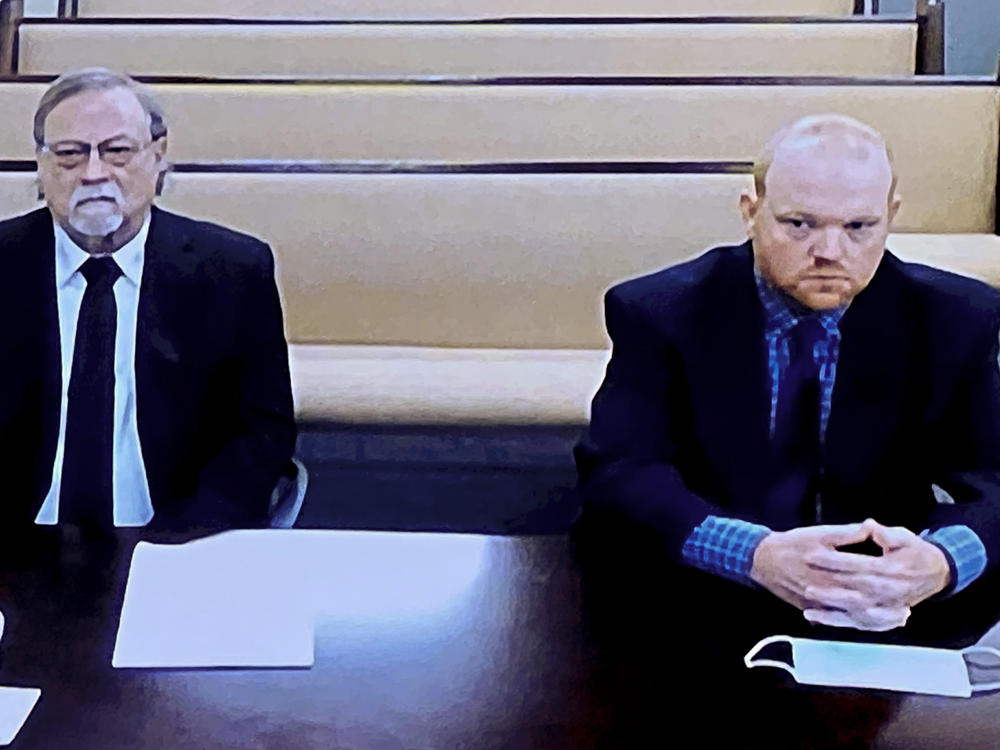Section Branding
Header Content
Father And Son Charged With Murder In Ahmaud Arbery Killing Are Denied Bond
Primary Content
The white father and son who took part in killing Ahmaud Arbery, a Black man who was fatally shot while jogging, have been denied bond.
Gregory, 64, and Travis McMichael, 34, two of three suspects facing malice murder and felony murder charges appeared for their bond hearing on Thursday and Friday via video conference in Glynn County, Georgia.
A Chatham County Superior Court judge denied bond for a third white man involved in the fatal shooting, saying William "Roddy" Bryan, was a potential flight risk.
Arbery's mother, Wanda Cooper-Jones, took some solace in the decision following the McMichaels' bond hearing.
"I'm relieved they'll stay behind bars," she told reporters. "Today was a good day," she added.
A day earlier, she read an emotional statement in court.
"In the name of justice, decency and fairness, please keep these men behind bars until they can answer for what they did," Cooper-Jones pleaded with the judge.
"Ahmaud wasn't allowed to go home. Ahmaud wasn't even allowed the chance to live."
Arbery, 25, was shot while he was out for a jog in a residential neighborhood near Brunswick, Ga., on Feb. 23. He was shot with a shotgun three times, twice in the chest.
The McMichaels claim that they armed themselves and chased after Arbery in their truck because he fit the description of a Black man involved in a string of neighborhood burglaries. But subsequent reporting shows no such crimes had been committed in more than seven weeks before Arbery's death. "There was only a burglary report after a gun was stolen from an unlocked vehicle in front of the McMichaels' home," CNN reported.
Bryan, a friend of the McMichaels, also set after Arbery in his own truck and recorded a 36-second video of the killing on his cell phone.
Gregory McMichaels, a former prosecutorial investigator and a retired Glynn County police officer, told police that he and his son tried to cut off Arbery with their truck, but that he turned to run in the opposite direction. Bryan then attempted to block the Black man's path. It's unclear what happened next but the elder McMichael says Arbery tussled over his son's shotgun before Travis McMichael shot him three times.
Bryan has maintained that he did nothing wrong and was merely a witness to what Arbery's family has called a lynching.
None of the three men were arrested for the killing for 10 weeks during which two district attorneys recused themselves, and an investigation by local authorities produced no charges. It wasn't until May 7, two days after the Georgia Bureau of Investigation took over the case that the McMichaels were taken into custody and charged with murder and aggravated assault. Bryan was charged days later.
The GBI is investigating the handling of the case by local prosecutors.
The deadly confrontation gained national attention after Bryan's video was leaked to the public and posted online in May. Arbery's death became part of the national outcry that forced a national reckoning on race and police brutality after the killings of Breonna Taylor in Louisville and George Floyd in Minneapolis.
Prosecutors on Thursday offered evidence that the younger McMichael was prone to using racial epithets online and in texts. Travis McMichael's longtime friend, Zachary Langford, was asked to testify about an October 2019 Facebook post by McMichael that read, "Sayonara" and used an offensive term for Asians.
Langford said he could not recall the post.
He was also asked about a text from the younger McMichael sent about a year ago. In it McMichael made a reference to "shooting a crackhead [offensive term for a Black person] with gold teeth and a Hi Point .45."
Langford testified that he did not remember the text but when shown evidence he had responded to the message, he said McMichael "was referring to a raccoon." Even when pressed about the details of the text, including the "crackhead" and "gold teeth" comments, Langford maintained McMichael was writing about an animal.
Attorneys for both of the McMichaels urged Judge Timothy Walmsley to set bond, saying the case has nothing to do with the fact that Arbery was Black.
"This case isn't about race, your honor," said Laura Hogue, who represents Gregory McMichael.
"This case in the indictment is about whether or not the private citizen's arrest law ... allowed Greg McMichael to do what he chose to do that day, for the sole purpose of defending his family, and his property and his community," she argued.
Meanwhile, Robert Rubin, one of Travis McMichael's defense attorneys, said his client was an asset to the community.
"He's proven that by always being employed, paying his taxes, never getting in trouble, never confronting people unless he himself is put in danger. And that was one time, by one man, named Ahmaud Arbery. And actually, Mr. Arbery confronted him twice," Rubin said.
Copyright 2020 NPR. To see more, visit https://www.npr.org.

